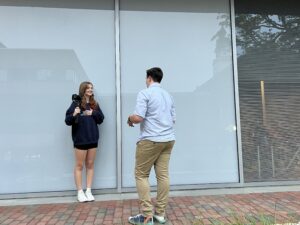Student Voice: How to build trust and conduct better student interviews
By Noah Farris
West Brunswick High ’24

Broadcast journalist Heather Wright, Fred T Ford High ‘25, spends a lot of time interviewing her classmates on camera.
She likes to start slowly, getting them acclimated to the interview process. She asks questions without simple yes or no answers in order to elicit good quotes. “You want to slowly get more personal,” she said.
The end result: A story featuring an honest, authentic student voice.
The job of a student journalist is to tell stories people want to interact with and learn from, that reflect the experiences of the student body. To tell a story that people will be interested in, the reporter must know their audience. But what does the journalist do when the people who are trying to tell their stories are not able to get their point across or provide the information you need?
There are tips and strategies that journalists can use to better their interviews and get more insightful information. When conducting an interview, here are things to keep in mind:
- Media literacy: Explain how an interview works, including terminology and the reporter’s intentions.
- Build comfort and a personal connection with the interviewee. Have a conversation.
- Ask questions that gives sources room to answer appropriately
- Find passionate people to interview and have enthusiasm for what you’re writing.
Media literacy
If someone has never been interviewed, journalists should take care to explain what to expect, said Kimberly Cataudella, service journalism reporter for the (Raleigh) News & Observer. It can make a major difference to explain important aspects of an interview, such as what it means for something to be off the record or that the source can end the interview whenever the person wants, she said.
“We want to make sure (the sources) know what the story will be about and our intentions,” she said.
Source comfort
The biggest priority when conducting interviews is to make sure the interviewee is comfortable, Cataudella said. They are trusting the reporter with information, and the reporter should respect their image and voice, she said.
“Make sure to take time in the beginning to address concerns,” Cataudella said.
Addressing any worries or misconceptions at the start can lead to a higher level of comfort on both sides of an interview. It shows the interviewee that you are speaking to them with their needs and comfort in mind.
During the interview, start slow. By gradually getting more personal you can dive into more difficult topics without it being abrupt, and the interviewee is given time to open up at their pace and trust the interviewer more. It is important to let the person know that you WANT to be there and you are interested in what they are saying.
“You need to get involved with what you are doing,” said Wright. “If you’re only half in it you’re only getting half a story.”
Ask good questions
It isn’t just about who you are interviewing, but how you conduct the interview. There are ways to ask questions that allow a person to speak freely and creatively.
Jessica Mahone, research director for the UNC Center for Innovation and Sustainability in Local Media is frequently interviewed about her work. The best interviewers have already read her research and ask questions that go deeper, she said.
“Ask open-ended questions that don’t result in yes-no or one word answers,” Mahone said.
Being knowledgeable
When the reporter is knowledgeable about a topic, it makes the conversation more relatable and more exciting for everyone involved. It’s also helpful to be intentional about who you ask for an interview. Make sure the person is a good fit for the story you want to tell.
“You are always looking for passionate people who want to help you tell a story,” Wright said.
An interview with someone who doesn’t want to be interviewed or who isn’t knowledgeable won’t be as interesting.
As you are getting further into the interview you want to be able to connect with the person and have a conversation rather than a simple Q&A. A person’s voice is powerful and it is important to find someone whose voice is the one you want telling the story.
“Find the person that best represents that voice,” Cataudella said.
